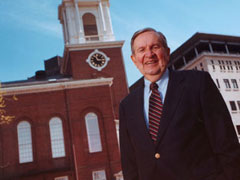|
St. Patrick's Day and the Secret Password Thursday, March 17, 2011 During the '90's, I took a couple of courses on the history of Boston at Harvard Extension School, taught by Boston College Professor Emeritus & University Historian Thomas O'Connor.  When he got to the history of Irish ascendancy in Boston politics, I asked if Evacuation Day had ever been celebrated before Irishmen took over Boston politics. (In 1906 "Honey Fitz" Fitzgerald was elected the first Irish mayor of Boston —and later gave his name to a presidential grandson.)
When he got to the history of Irish ascendancy in Boston politics, I asked if Evacuation Day had ever been celebrated before Irishmen took over Boston politics. (In 1906 "Honey Fitz" Fitzgerald was elected the first Irish mayor of Boston —and later gave his name to a presidential grandson.)
Evacuation Day, unknown in the rest of the United States, was the day in 1776 that the British left Boston Harbor. The night before, General Washington had sneaked cannon up to the Dorchester Heights overlooking the harbor, which cannon gave the British the motivation to board their ships and to quit the vicinity. It became a legal holiday in Greater Boston in 1901, coincidentally at the same time that Irishmen were first taking over the local Democratic party and then Boston government in general. —And, oddly enough, the historic event had occurred, 125 years earlier, on the seventeenth day of March.  "Well," says Professor O'Connor, "I'll tell you about that. One night I was giving a lecture in a big hall in South Boston." (South Boston is an area run by Irish politicians and, until about that time in the 1990's, by the Irish Mafia headed by Whitey Bulger.) "During my talk, someone referred to the tradition that Washington's troops used the password 'St. Patrick' on the dark night they moved those cannon. I said that I had never found documentation of the use of 'St. Patrick.'
"Well," says Professor O'Connor, "I'll tell you about that. One night I was giving a lecture in a big hall in South Boston." (South Boston is an area run by Irish politicians and, until about that time in the 1990's, by the Irish Mafia headed by Whitey Bulger.) "During my talk, someone referred to the tradition that Washington's troops used the password 'St. Patrick' on the dark night they moved those cannon. I said that I had never found documentation of the use of 'St. Patrick.'
"Someone shouted, 'Me granmudder tole me the password was St. Patrick!' Some guy fairly screamed, 'Fodder O'Malley tole me it was so!' "I looked desperately all around me for the nearest escape route, fearing for my life. All of sudden a little guy in the back yelled, 'Ladies and gentleman, the refreshments are ready in the next room! And I'm sure Professor O'Connor will look until he finds the historical proof.' It was [State Senate President] Billy Bulger." Professor O'Connor never did actually answer my question —to the delight of the class. Among his many informative stories, one is my favorite because it is so strikingly succinct and illustrative. The Professor was telling us about the differences between the Republican and Democratic parties and their modi operandi in Boston at the dawn of the twentieth century: A canvassing Brahmin lady knocked on the door of an Irishwoman and asked for a vote for her brother, an incumbent elected official. The Irish gal asked, "What has your brother done for you?" The blueblood replied, "Oh, my brother would never use his office for my gain!" The Irish gal retorted, "If he won't do anything for his own sister, what the hell is going to do for me?" |